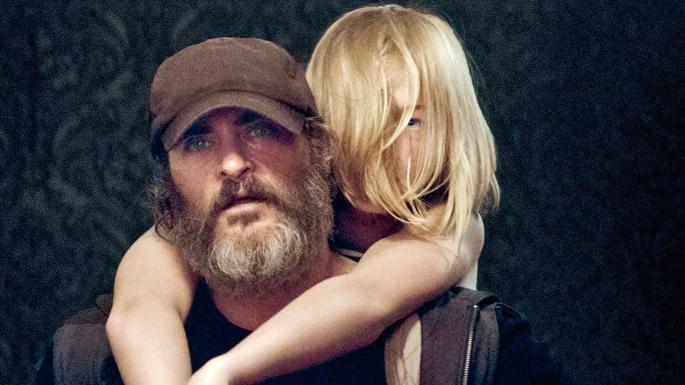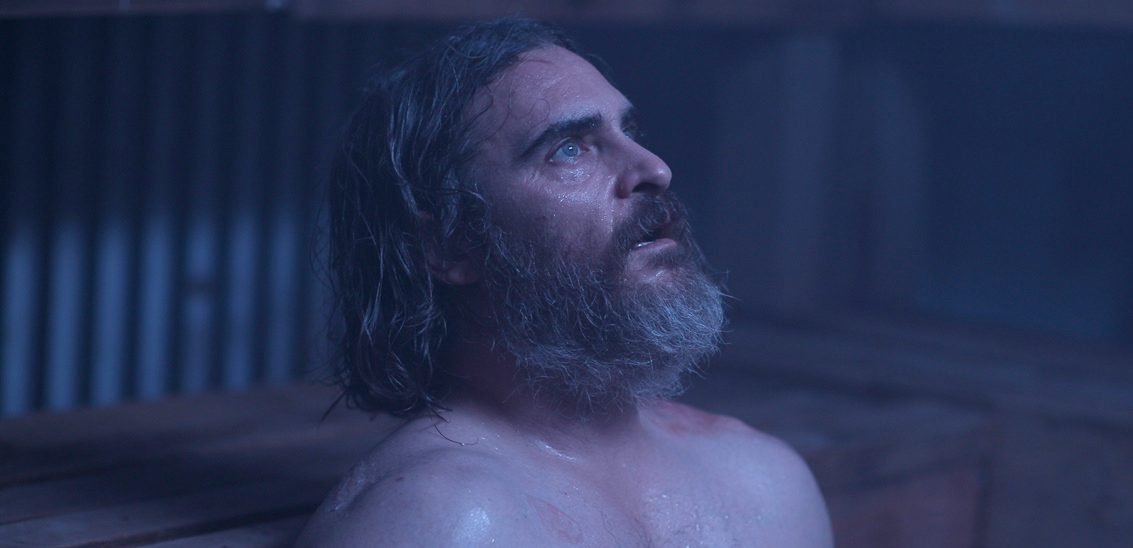After watching You Were Never Really Here, I found myself wondering just what it is about Joaquin Phoenix that makes him such a compelling actor. He is talented, to be sure, but it’s more than that. Phoenix gives his characters rich internal lives – watch him in The Master or Gladiator, and you can see his characters’ interiority displayed externally. It’s not just being silent; any actor can do that, and a lot do.
Phoenix allows us to see his characters thinking, reasoning, feeling. He says more with a sideways glance or a conversational pause than most actors can with an entire monologue, and as a result all of his characters feel whole and lived-in (even when that character is himself; remember that he was so good in I’m Still Here that he had a good portion of the country convinced he had actually given up acting in favor of hip-hop).
In YWNRH, Phoenix plays Joe, a brutal, troubled man who specializes in retrieving kidnapped young girls. Director Lynne Ramsay (We Need to Talk About Kevin) teases out parts of Joe’s backstory without ever indulging in a hacky flashback. Joe is a combat veteran, and traumatized after witnessing the death of a child. He lives with his mother, with whom he has a teasingly affectionate relationship. Ramsay withholds where other directors would indulge, letting her story unfold with the surety, certainty, and inevitability of a dream.
Joe gets hired to retrieve the daughter of a New York state senator, a girl named Nina Votto. This sets in motion a plot that (somewhat justifiably) be likened to movies like Taken, Taxi Driver, or The Searchers. But Ramsay has more on her mind than mere carnage, although YWNRH certainly comes with that. Here, too, she holds back, showing us Joe’s rampage through a brothel only through security cameras. His weapon of choice is a ball-peen hammer, and the lack of blood or viscera somehow makes this sequence more unsettling, as it leaves it up to the viewer’s imagination. Here the film becomes almost interactive, as Ramsay seems to tells us, You know what bloodshed looks like; just imagine it here.
Joe and Nina have an instant connection, as the girl is just as silent and introspective as Joe. Neither of them exhibit much outward reaction to stimuli. As Nina, Ekaterina Samsonov mirrors Phoenix’s performance, both of them acting like ghostly shells of people. Both Nina and Joe have occasional voiceovers in the film, deepening their connection and the doubling effect that the film aims for. When Nina is taken yet again, it sets Joe on the warpath, in which he is more often the victim of than the perpetrator of violence. Ramsay offers us precious little catharsis, and seems more interested in how violence begets further violence (although the dreamlike tone of the film keeps it from proscriptive moralizing).
Phoenix is revelatory as Joe. He won the Best Actor award at Cannes for his work here, and it’s easy to see why. Joe is never less than three-dimensional, and Phoenix’s face is the most expressive it’s ever been. We see all of Joe’s rage, sadness, and protective instincts. Joe dresses in drab, nondescript clothing, and walks with a lumbering gait not unlike Frankenstein’s monster. Although he blends in to the crowd (echoes of Gene Hackman’s performance in The Conversation), it’s impossible to take your eyes off of him.
 With his long hair and bushy beard, Joe looks like a smudged version of a human being, and at times the film lives up to its title and makes you wonder if Joe, or Nina, or both, are ghosts, or if they ever existed in the first place. At one point, Joe fantasizes about graphically killing himself, while everyone goes about their business, oblivious to his death. Joe represents something elemental to Ramsay: guilt, loss, masculinity, displacement. This is a man with no place in this world, whose death will mean nothing.
With his long hair and bushy beard, Joe looks like a smudged version of a human being, and at times the film lives up to its title and makes you wonder if Joe, or Nina, or both, are ghosts, or if they ever existed in the first place. At one point, Joe fantasizes about graphically killing himself, while everyone goes about their business, oblivious to his death. Joe represents something elemental to Ramsay: guilt, loss, masculinity, displacement. This is a man with no place in this world, whose death will mean nothing.
One of the most impressive things about You Were Never Really Here is the way in which Ramsay (who also wrote the screenplay) bucks conventions. This is not so much a subversion of these types of films, but rather a deconstruction of it. In Taxi Driver and The Searchers, men seek to rescue women who might not want to be rescued. In YWNRH, Joe rescues a woman who doesn’t need it: Nina is more than capable of taking care of herself, and Joe is barely a participant in the film’s climax.
Jonny Greenwood’s jarring, discordant score undermines any semblance of heroism, yet the film never crosses over into nihilism; like all of Greenwood’s best work, the music plays to the beauty and the darkness in the world, suggesting that not only can they live together, but they actually strengthen each other. Like Joe, the film wears it heart on it sleeve. Among its bevy of beautiful images, the most striking is that of Joe and one of his dying victims, lying on a kitchen floor, holding hands and singing along to a song on the radio.
You can probably guess the plot to You Were Never Really Here – but you can’t guess how it will make you feel. Lynne Ramsay’s film is raw, unsettling, occasionally very funny, and impossible to look away from. This is a film that grabs you from its first frame, a film that you feel along your spine. It’s hard to imagine another director doing such a great job with the material, or another actor bringing it to such vivid, unforgettable life.
4.5/5


